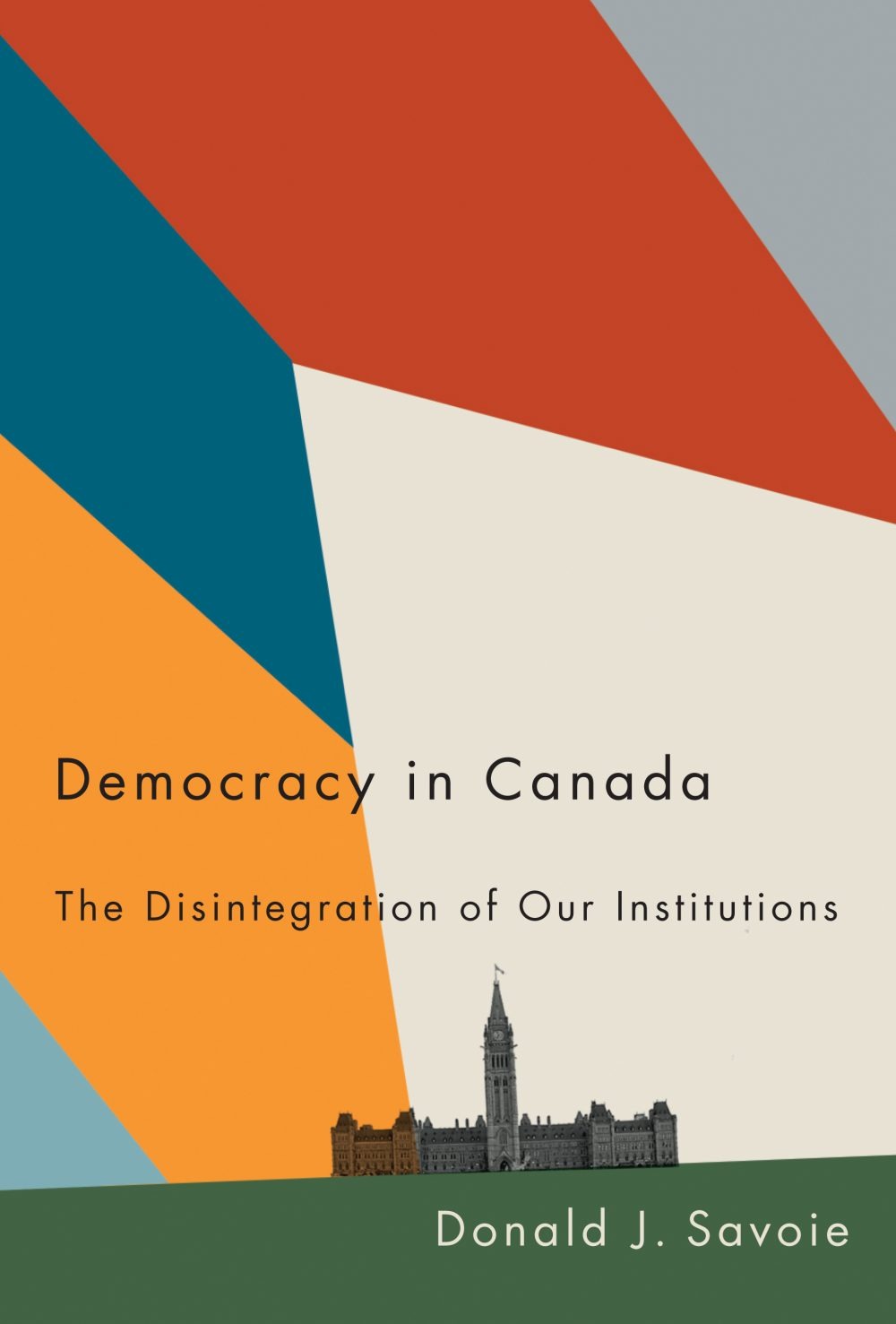Canada’s Democratic Deficit
Donald J. Savoie
Democracy in Canada: The Disintegration of our Institutions. Montreal and Kingston: McGill-Queen’s University Press, 2019.
Review by Daniel Béland
 Donald Savoie is Canada’s best-known expert of public administration, and he has published many influential books over the years. His newest, Democracy in Canada, is the most ambitious of all, and Savoie makes it clear in the preface that he sees it as his “magnum opus.” Readers familiar with his work will recognize key themes he has worked on extensively in his previous books. Yet, in Democracy in Canada, after evoking C.B. MacPherson and Alexis de Tocqueville, he revisits these issues by asking a very general question: “How healthy is Canadian democracy?” His answer is that it is deeply unhealthy and that a series of historical and institutional factors explain this dire situation.
Donald Savoie is Canada’s best-known expert of public administration, and he has published many influential books over the years. His newest, Democracy in Canada, is the most ambitious of all, and Savoie makes it clear in the preface that he sees it as his “magnum opus.” Readers familiar with his work will recognize key themes he has worked on extensively in his previous books. Yet, in Democracy in Canada, after evoking C.B. MacPherson and Alexis de Tocqueville, he revisits these issues by asking a very general question: “How healthy is Canadian democracy?” His answer is that it is deeply unhealthy and that a series of historical and institutional factors explain this dire situation.
Turning to historical institutionalism—a theoretical approach developed in the late 1980s and early 1990s—Savoie argues that “change in Canada is difficult because our political and administrative institutions were constructed from a British historical and cultural experience with no effort or desire to bring into the mix Canadian realities.” For him, the drawback that “none of our institutions are home grown” is especially obvious with regard to the Senate, which is primarily seen as a site of “sober second thought” rather than a tool for (intrastate) regional representation. Regarding this issue, Savoie refers to the situation of other countries, especially Australia and the United States, to shed light on the Canadian case.
Savoie thinks the example of the Senate points to a broader reality: the fact that, to quote the title of Chapter 6, “Everything Canadian is Regional, Except National Political Institutions.” In a country where Ontario and Quebec continue to dominate federal politics, it means that Atlantic and Western provinces struggle to have their voices heard, which weakens Canadian democracy. Savoie argues that this problem is exacerbated by the gradual centralization of power in the hands of the prime ministers and their courtiers, a trend associated with a sharp decline in the influence of the cabinet, which has traditionally featured strong regional voices.
Beyond this lack of regional representation, according to Savoie, Canadian democracy is facing other challenges, including the post-Charter rising influence of the courts, the deinstitutionalization of the country’s media sector, and a public sector incapable of renewing itself to address profound managerial problems. More generally, what Savoie depicts is a paradoxical mix of institutional disintegration and path dependence related to the incapacity of our political elite and system to bring about constitutional change. Although today the issue of a democratic deficit is widely debated all over the world, the book remains focused primarily on what is specific about the contemporary Canadian experience.
What can we do to address a democratic deficit stemming largely from a lack of regional representation within the federal state? In the last chapter, Savoie puts a number of suggestions forward: reducing the power of the prime minister; re-empowering Cabinet, Parliament and backbenchers; ending omnibus bills; organizing the Senate along regional lines; making information about regional federal spending more easily accessible; reducing the staff of central agencies; and, improving public management.
Savoie believes none of these reforms requires constitutional change and he seems to place his hope in the “political will” of a prime minister eager to bring about change to fix Canadian democracy. The book thus ends on this call: “What is needed is a prime minister who is as firmly committed to fixing our political institutions as Pierre E. Trudeau was in patriating Canada’s Constitution. Nothing less will succeed, as history demonstrates.”
This poignant call is also a desperate one, as it places the future of Canadian democracy in the hands of the prime minister, a figure whose growing power, for Savoie, incarnates one of the major problems plaguing our democratic institutions. After writing more than 360 pages on the path-dependent nature of institutions, he resorts to the vague concept of “political will” and the quasi-monarchic figure of the prime minister at the centre of contemporary “court government” (a concept Savoie popularized in his earlier work but does not deploy in this book) to rescue Canadian democracy. This approach points to the challenge facing historical institutionalism to account for change, which scholars like Jacob Hacker and Kathleen Thelen diagnosed more than 15 years ago.
Yet, instead of drawing on their work, Savoie places his hopes in a benevolent prime-ministerial saviour. Ironically, he does not seem to perceive citizens and their capacity to mobilize and bring about political change as potential sources of contemporary democratization. Considering the original meaning of the word democracy (rule of the people), this is problematic. Savoie’s vision of democratic and institutional change is elite-centric.
These critical comments and the fact that the book is quite long and repetitive should not prevent scholars and practitioners from reading and engaging with this rich and ambitious work. Hopefully, it will encourage others to focus attention on the “big picture” and the challenges facing Canadian democracy today. Grounded in Savoie’s deep institutional knowledge and practical experience, Democracy in Canada is a flawed book well worth reading.
Daniel Béland is Director of the McGill Institute for the Study of Canada and James McGill Professor in the Department of Political Science at McGill University.
